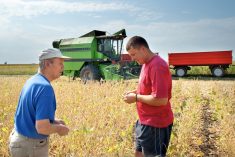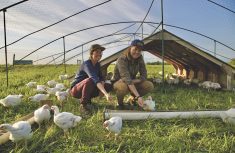It isn’t as if you made the decision lightly. In fact, it may be the hardest decision you’ve ever had to make. The idea of retiring rather than working until you drop took months — years actually — to get used to, not to mention the hours of emotional wrestling before you could look yourself in a mirror without feeling guilty for wanting a small slice of what everyone else in society takes for granted.
But facts are facts. The kids don’t seem like they’re interested in taking over.
Read Also

Ground rules for farm family communications
Establishing meeting ground rules can help your family find ways to communicate that work for your farm. Here are some…
Heaven knows, as you’ve told yourself time and again, you can’t farm today unless you’re totally dedicated.
Even so, the farm is home. It’s where the kids grew up, so you can’t blame them for feeling strongly about it. The farm means family to them, and not only to them. They love bringing the grandkids out to visit too, telling them how the farm runs deep in all their veins.
So, you decide, you’ll just have to make the announcement and tell them you’re going to sell out.
“Not so fast,” says Elaine Froese, a Boissevain, Man. farm family coach. Before you put up that “For Sale” sign there are some critical steps to work through.
That includes making one more check to be sure you know where everybody stands. Avoid the “nobody asked me” syndrome, says Froese. This typically happens when children, especially girls, aren’t invited into discussions about the future of the family farm.
Be sure to talk to ALL of the children about your desire to retire and sell, Froese says. Don’t assume your kids aren’t interested in farming. Sometimes these discussions will spur adult children who have moved away to leave their careers in the city and return to the farm, she says.
Don Campbell, a rancher in Meadow Lake, Sask. who helps facilitate farm transfers agrees that you need to have the conversation about the future of the farm with your kids. The biggest hurt is often caused by poor communication, says Campbell. “It’s OK for parents to ask their kids if they are interested in taking over the farm and it’s OK for the children to ask if there is a place for them on the farm and if so, what does it look like,” he says.
No secrets, no gossip
If you’ve explored the options with the kids and you are certain now is the right time to sell, be open and up front about the process.
“There should be no family secrets and no family gossip,” says Froese.
John Fast, a family business coach in Waterloo, Ont. agrees. People don’t like surprises so don’t be secretive about your decision, Fast says. Be open about your reasons for selling. Even if you’ve received a sudden offer from a gravel pit company or land developer, talk to the kids before you sign on the dotted line.
Holding a family meeting can clear the air so nobody is making assumptions and jumping to conclusions, says Froese. “It’s better not to be guessing and trying to read minds,” she says. Not knowing what’s going on is the bigger source of stress, she adds. People can learn to live with the decision if they understand why it was made.
Before moving forward with a plan, both parents need to make sure they are in agreement and united in their decision. “If the parents aren’t united, children will often play one parent against the other,” says Froese, who recommends parents seek outside counselling if they’re not in agreement. Parents should also seek financial planning advice to be sure they are putting their own needs first, she says.
When a farm is sold outside the family, it’s important to understand that people will often experience a sense of loss and grief at the sale, says Froese. For the parents, it’s also the loss of a dream if they had hoped that one day their children would follow in their footsteps and take over the farm.
A family project
There are many ways to make the transition easier for everyone involved. For example, Froese says you could capture special memories by taking pictures and creating a scrapbook, saving some rocks from the rock pile, keeping some barnboards to make picture frames, using an old barn window to make a mirror frame, or welding some old farm implement parts into a sculpture. If there’s a garden, transplant some of the flowers to your new garden. Be creative and explore ways that are meaningful to your family.
There are also professional services that can help you preserve your farm memories. For example, in Acton, Ont., Nora Zylstra-Savage and her partner, Carol Pollock of Storylines (www.myHouseMemories.com), create customized hardcover books with photographs, voice recordings and written text.
For 20 years Zylstra-Savage had been helping people write their memoirs before she founded Storylines last year. And Pollock, who is from a farm in Bruce County, saw the need with so many farms in their area being bought by developers, which upset the extended families. “These books of memories help to document and acknowledge the past and maybe heal a few hearts,” says Zylstra-Savage.
In Moose Jaw, Sask., mother-daughter duo Kelly Thorson and Jess Zoerb of Farm Legacy Photography (farmphotography.org) create hardcover books and framed prints from the artistic photographs they take of the farm. Thorson also operates a graphics company, Kel-T-grafix (kel-t-grafix.com) from her farm in Holdfast and can make a range of products including calendars, cards, clothing, signs and etched glasswork with farm images.
You can also create a coffee table-style book yourself using your own photographs through online custom book publishers such as blurb.com, blacks.ca, photoinpress.ca and photobookcanada.com.
Holding one last family gathering at the farm to mark the occasion can also be a good way to say goodbye, suggests Froese. For example, you could have a family picnic and a walk around the farm. You may also want to ask permission from the new owners to walk the property in the future.
Froese cautions that it takes time to process the complex feelings of loss when the farm leaves the family. If the situation becomes highly charged, she recommends seeking an outside facilitator, preferably someone with a farm background. Make sure every voice at the table is heard and try to understand what the issues are. “Is it hurt, frustration, anger?” Froese asks. “You need to understand what is behind the emotions.”
Of course, the other option is simply not to deal with the hard issues at all, hoping they’ll take care of themselves.
You never farmed like that, though, so don’t become that kind of farmer when you leave, says Froese. “Good farmers don’t avoid conflict.” CG















